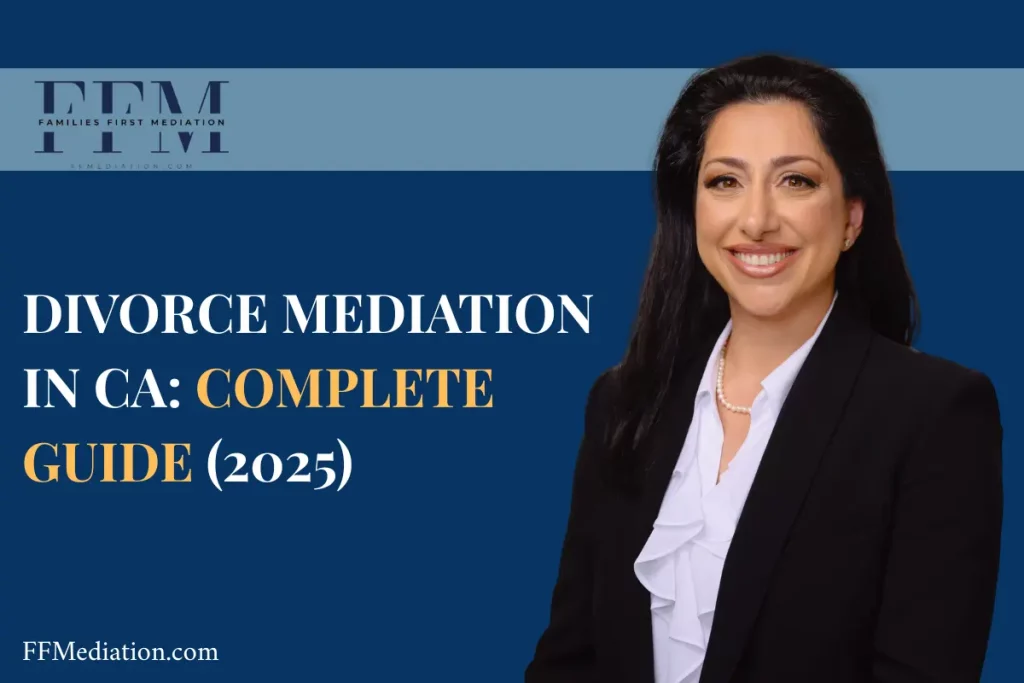Providing Divorce Mediation Services Throughout California
Providing Divorce Mediation Services Throughout California
Home » Divorce and Family law Blog » California Divorce Mediation Complete Guide (2025)

Dina Haddad and her team provide expert mediation services for Californians. If you want help related to any family law issue, call us or book a consult.
Divorce mediation in California is best for helping couples reach an agreement without going through the hassle and high costs of traditional court processes.
It is a popular option because it helps couples settle issues without fighting or being confrontational. This guide will provide all the information you need to prepare for divorce mediation.
Schedule a FREE Divorce Mediation Consultation Call to understand how Dina Haddad can help you through divorce mediation
Divorce mediation is where a neutral third party, known as a mediator, facilitates a discussion for a couple to reach a fair agreement.
Unlike divorce lawyers, who represent one party, a divorce mediator is more of a neutral party to both spouses and assists them in coming up with solutions that cater to every party’s interests.
Mediators are cooperative and solution-oriented, making the divorce process less expensive, less stressful, and more efficient than traditional litigation.
While some special situations may require a divorce lawyer, mediation has proven to be the most optimal route, especially for couples that wish to avoid lengthy court battles.
Divorce mediation allows couples to work through their issues systematically, which is often more favorable than going to court.
Every mediation session follows a procedure that includes the following components:
This structure primarily shows how straightforward and focused divorce mediation is in helping you reach agreements tailored to your needs. Keep in mind that not all situations are effective for mediation, which is where the next section comes in.
Learn More: How to Verify if My Divorce is Final in California?
For cases involving child custody and visitation, mediation can be effective.
Here’s a complete and detailed breakdown of when you should and shouldn’t consider mediation or go for divorce litigation if your divorce is highly contested.
When Mediation Is Best:
When Mediation Is Not Recommended:
While mediation is not compulsory, it can encourage cooperation and prevent prolonged court proceedings.

Understanding the drawbacks and benefits of divorce mediation can assist you in making a more informed decision.
Also, note that agreements can be customized to fit your unique needs. This gives both parties more control over the outcomes.
All parties must understand that agreements crafted during mediation are non-enforceable until presented before a court of law.
This means the mediator will have to present the agreed-upon terms to a California Family Law court for enforcement.
Adequate preparation before attending mediation increases the likelihood of a smooth divorce process. Taking the time to also prepare your thoughts ahead of time will be beneficial to you emotionally.
So, how then do you prepare for mediation? Prepare better by following Experienced Divorce Mediator Dina Haddad’s , tips and tricks, mediation blog, and 90-Item Divorce Mediation Checklist.
Look for the best divorce mediator near me, with specific expertise in family law and a proven history of successful mediations.
Communication is vital, so ensure the mediator’s general approach aligns with yours. Check clients’ testimonials or ask trusted people for recommendations.
Contact us with any questions or book a FREE Divorce Mediation Consult today.
The duration of a divorce mediation in California can differ based on the complexity of the issues involved and how cooperative both spouses decide to be. At the most basic level, mediation takes about 3 to 6 months to complete.
Also note that California law also has a minimum 6-month waiting period after the date the divorce petition is served before the divorce can be finalized.
The factors below will most likely increase the divorce mediation time frame:
Unlike litigation, mediation allows for faster resolution since couples can receive an emotionally healthy outcome without needing to take the other spouse to court.
The flexibility allows couples to navigate the process without feeling overwhelmed.
Divorce mediation in California is usually cheaper than litigation, but varies with factors including the location. The estimated costs are as follows:
There are multiple factors that affect the total cost of divorce mediation. The total cost for mediation tends to go up with the number of sessions. More complex issues, such as extensive finances or custody battles, usually raise overall costs.
Read More: What Are the Costs of Various Divorce Options in California?
After a mediation session, the agreements made are presented in a contract which can then be enforced by law. In order to do so, follow this guide:
After mediation, the mediator prepares a written document of all the terms that have been agreed upon.
Each spouse will sign the agreement which will then be forwarded to the appropriate family court in California for signing and concurrence.
According to California law, a court agreement only becomes enforceable after it has been lodged at the family court. There is also a legal waiting period of six months before the divorce is deemed ready for finalization. During this time, the court reviews the agreement and determines if it fulfills the basic legal standards.
The court grants approval and the document becomes enforceable, meaning it has the weight of law.
A spouse’s non-compliance with the terms permits the other party to file a motion for contempt of court. This enables the court to act in the enforcement and breach of terms.
While the divorce is complete, unexpected life experiences may require a modification of the agreements.
These circumstances may include a drop in come, changes in employment, or a shift in parental obligations.
Regardless, the courts can assess the situation and altar the document on factors like child support, custody, or even spousal support.
Having both parties come to the table prepared and willing to collaborate on tackling issues is crucial. Consider these tips for a successful mediation session:
We’ve compiled various helpful tools and resources to support you through the divorce mediation process.
We offer Divorce Mediation Checklists and other relevant articles and guide templates to help divorcing couples navigate divorce productively.
These resources are created by expert divorce professionals like Super Lawyer Dina Haddad and Financial Mediator Elizabeth Stephens.
Our FAQ section provides concise answers to questions like “How long does mediation take?” and “Is it possible to change my mind after agreeing to terms?”
This section explains common issues and questions which divorcing couples may have.
Dina Haddad offers FREE Divorce Mediation Consult where you can freely ask questions unique to your situation. It’s a way to learn how divorce mediation can help you before financially committing to the sessions.
Feel free to use the California Self-Help Court Guide for a more comprehensive understanding of the legal process surrounding divorce and mediation in California.
Divorce mediation has proven to be an effective method for conflict resolution because it avoids the hassle and cost of traditional litigation.
With proper preparation and understanding of the mediation process, couples can arrive at customized solutions that work for them.
Book a FREE Divorce Mediation Consultation with Dina Haddad if you want someone to guide you through the mediation process.
In California, divorce mediation is usually between 3 to 6 months long. This is contingent on the intricacies of the case and the willingness of both parties to work collaboratively.
Additionally, California law imposes a mandatory 6-month waiting period from the day the divorce petition is served before the divorce can be finalized.
In mediation, assigning blame and anger are two aspects that should be avoided. Moreover, issuing ultimatums can put a halt to progress.
It is encouraged to use respectful language and foster positive communication that helps find a solution both parties can agree with.
Mediators dealing with divorce cases are likely to have different rates. For private mediation, the entire charge ranges between $5,000 and $15,000.
These prices are significantly lower when it comes to court-ordered mediation, which is free but woohoo food limited in scope.